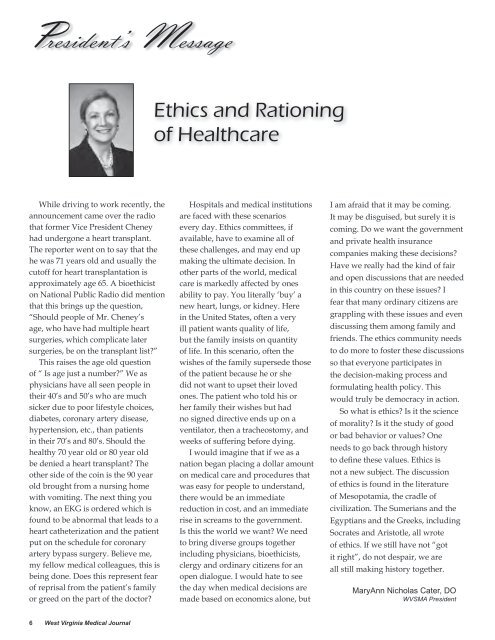Special CME Issue - West Virginia State Medical Association
Special CME Issue - West Virginia State Medical Association
Special CME Issue - West Virginia State Medical Association
You also want an ePaper? Increase the reach of your titles
YUMPU automatically turns print PDFs into web optimized ePapers that Google loves.
President’s Message<br />
Ethics and Rationing<br />
of Healthcare<br />
While driving to work recently, the<br />
announcement came over the radio<br />
that former Vice President Cheney<br />
had undergone a heart transplant.<br />
The reporter went on to say that the<br />
he was 71 years old and usually the<br />
cutoff for heart transplantation is<br />
approximately age 65. A bioethicist<br />
on National Public Radio did mention<br />
that this brings up the question,<br />
“Should people of Mr. Cheney’s<br />
age, who have had multiple heart<br />
surgeries, which complicate later<br />
surgeries, be on the transplant list?”<br />
This raises the age old question<br />
of “ Is age just a number?” We as<br />
physicians have all seen people in<br />
their 40’s and 50’s who are much<br />
sicker due to poor lifestyle choices,<br />
diabetes, coronary artery disease,<br />
hypertension, etc., than patients<br />
in their 70’s and 80’s. Should the<br />
healthy 70 year old or 80 year old<br />
be denied a heart transplant? The<br />
other side of the coin is the 90 year<br />
old brought from a nursing home<br />
with vomiting. The next thing you<br />
know, an EKG is ordered which is<br />
found to be abnormal that leads to a<br />
heart catheterization and the patient<br />
put on the schedule for coronary<br />
artery bypass surgery. Believe me,<br />
my fellow medical colleagues, this is<br />
being done. Does this represent fear<br />
of reprisal from the patient’s family<br />
or greed on the part of the doctor?<br />
Hospitals and medical institutions<br />
are faced with these scenarios<br />
every day. Ethics committees, if<br />
available, have to examine all of<br />
these challenges, and may end up<br />
making the ultimate decision. In<br />
other parts of the world, medical<br />
care is markedly affected by ones<br />
ability to pay. You literally ‘buy’ a<br />
new heart, lungs, or kidney. Here<br />
in the United <strong>State</strong>s, often a very<br />
ill patient wants quality of life,<br />
but the family insists on quantity<br />
of life. In this scenario, often the<br />
wishes of the family supersede those<br />
of the patient because he or she<br />
did not want to upset their loved<br />
ones. The patient who told his or<br />
her family their wishes but had<br />
no signed directive ends up on a<br />
ventilator, then a tracheostomy, and<br />
weeks of suffering before dying.<br />
I would imagine that if we as a<br />
nation began placing a dollar amount<br />
on medical care and procedures that<br />
was easy for people to understand,<br />
there would be an immediate<br />
reduction in cost, and an immediate<br />
rise in screams to the government.<br />
Is this the world we want? We need<br />
to bring diverse groups together<br />
including physicians, bioethicists,<br />
clergy and ordinary citizens for an<br />
open dialogue. I would hate to see<br />
the day when medical decisions are<br />
made based on economics alone, but<br />
I am afraid that it may be coming.<br />
It may be disguised, but surely it is<br />
coming. Do we want the government<br />
and private health insurance<br />
companies making these decisions?<br />
Have we really had the kind of fair<br />
and open discussions that are needed<br />
in this country on these issues? I<br />
fear that many ordinary citizens are<br />
grappling with these issues and even<br />
discussing them among family and<br />
friends. The ethics community needs<br />
to do more to foster these discussions<br />
so that everyone participates in<br />
the decision-making process and<br />
formulating health policy. This<br />
would truly be democracy in action.<br />
So what is ethics? Is it the science<br />
of morality? Is it the study of good<br />
or bad behavior or values? One<br />
needs to go back through history<br />
to define these values. Ethics is<br />
not a new subject. The discussion<br />
of ethics is found in the literature<br />
of Mesopotamia, the cradle of<br />
civilization. The Sumerians and the<br />
Egyptians and the Greeks, including<br />
Socrates and Aristotle, all wrote<br />
of ethics. If we still have not “got<br />
it right”, do not despair, we are<br />
all still making history together.<br />
MaryAnn Nicholas Cater, DO<br />
WVSMA President<br />
6 <strong>West</strong> <strong>Virginia</strong> <strong>Medical</strong> Journal















